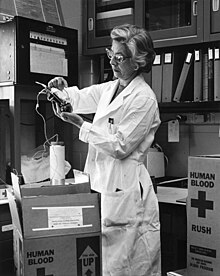Sarah Stewart (cancer researcher)
Sarah Stewart | |
|---|---|
 Sarah Stewart | |
| Born | August 16, 1905 |
| Died | November 27, 1976 (aged 71) |
| Citizenship | USA |
| Alma mater | Georgetown University School of Medicine |
| Known for | first describing the Polyomavirus |
| Scientific career | |
| Fields | Viral Oncology |
| Institutions | United States Public Health Service |
Sarah Stewart (August 16, 1905 – November 27, 1976) was a Mexican American researcher who pioneered the field of viral oncology research, the first to show that cancer-causing viruses can spread from animal to animal. She and Bernice Eddy co-discovered the first polyoma virus, and Stewart-Eddy polyoma virus is named after them.[1]
Biography
Early life and education
Sarah Elizabeth Stewart was born on August 16, 1905 in Tecalitlán, Jalisco, Mexico.[2] Born to a Mexican mother and American engineer father, she moved back to the United States at the age of 5.[1] Due to the Mexican Revolution in 1906, she and her family were asked to leave the country, forcing them to migrate to the United States.[3] She did her undergraduate work at the New Mexico State University, graduating with a Bachelor of Science in 1927. She went on to earn a master's degree from the University of Massachusetts Amherst in 1930 and a Ph.D in microbiology from the University of Chicago in 1939. In 1949, she became the first woman to be awarded an MD Degree from Georgetown University School of Medicine.[4]
Career

Stewart joined the National Institutes of Health (NIH) from 1935-1944 while completing her PhD at the University of Chicago.[1] During her time there, she took part in developing a vaccine for gangrene, which helped many soldiers during the second world war.[3] She later left her position in the NHI in order to pursue her goals and research field, which was to prove that there was a connection between cancers and viruses.[3] This proved to be difficult because, at the time, not many scientist took this field seriously.[3] She had also recreated Ludwik Gross’ experiment with mice, which showed that the Leukemia found in certain mice was indeed caused by viruses; they released a paper together discussing their findings.[3] She went on to teach microbiology at Georgetown University's School of Medicine, and once women were allowed to enroll, she became their first female graduate at the age of 39.[1][5] Stewart returned to the NIH in 1951, joining the National Cancer Institute (NCI), and eventually becoming medical director.[1]
Stewart developed an interest in researching viral links to cancer in light of the pioneering research of Jonas Salk in developing a vaccine for the virus which caused polio. Stewart is credited with discovering the Polyomavirus in 1953.[4] She and research partner, Dr. Bernice E. Eddy, were successful in growing the virus in 1958 and the SE (Stewart-Eddy) polyoma virus is named after them. They were able to prove that the polyoma virus could create 20 different kinds of tumors in mice as well as other animals.[1] Stewart was the first to successfully demonstrate that viruses causing cancer could be spread from animal to animal.[6] This experiment and its results, amongst other similar experiments, led many researchers to becoming interested in the field viral oncology.[1] She left the NIH to become professor at Georgetown University in 1971.[5]
Death and afterward
Stewart died of cancer at her home in New Smyrna Beach, Florida on November 27, 1976.[7] A collection of her papers is held at the National Library of Medicine in Bethesda, Maryland.[8]
Awards
In 1965, Stewart was awarded the Federal Women’s Award.[1] She also won the Lenghi Award of the Accademia Nazionale Dei Lincei and the Daughters of Penelope Salute to Women Award in 1972 amongst many more.[2]
References
- ^ a b c d e f g h Fulghieri, Carl; Bloom, Sharon (2014). "Sarah Elizabeth Stewart". Emerging Infectious Diseases. 20 (5): 893–895. doi:10.3201/eid2005.131876. ISSN 1080-6040. PMC 4012821. PMID 24751102.
- ^ a b Cancer Research, Sarah Stewart, Obituary, Volume 37, 4675
- ^ a b c d e McNeill, Leila. "The Woman Who Revealed the Missing Link Between Viruses and Cancer". Smithsonian. Retrieved 2019-10-07.
- ^ a b Biography from gwis.org Archived 2008-07-04 at the Wayback Machine
- ^ a b "Sarah stewart student research lecture series". Georgetown University.
- ^ Stanley, Autumn. Mothers and Daughters of Invention, Page 165. 1993, Rutgers University Press.
- ^ Smith, J. Y. (1976-12-08). "Dr. Sarah Stewart, Cancer Researcher, Dies". The Washington Post. p. C15.
- ^ "Sarah E. Stewart Papers 1927-1977". National Library of Medicine.
- 1905 births
- 1976 deaths
- Cancer researchers
- Georgetown University School of Medicine alumni
- Mexican people of American descent
- Mexican emigrants to the United States
- New Mexico State University alumni
- University of Chicago alumni
- University of Massachusetts Amherst alumni
- American virologists
- 20th-century American physicians
- Hispanic and Latino American people
- 20th-century American women scientists
- Physicians from New Mexico
- 20th-century American women physicians
